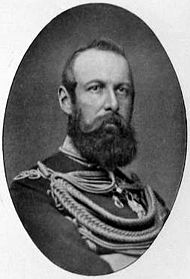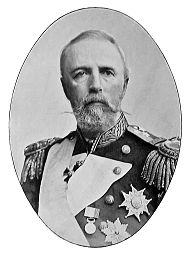- Dissenter Acts (Sweden)
-
 Karl XV before his death in 1872.
Karl XV before his death in 1872.
 Oscar II in a pre-1900 photograph.
Oscar II in a pre-1900 photograph.
Dissenter Acts were laws, enacted by the King of Sweden with the consent of the Swedish Parliament, which gave nonconformists who wanted to leave the then established Church of Sweden the right to do so, provided that the dissenters then joined one of the state-approved denominations. The first such edict was decreed in 1860 by Karl XV and the Ståndsriksdag; the second one in 1873 by Oscar II and the reorganized bicameral Riksdag. Neither the Ståndsriksdag, divided into four Estates, nor the newer Riksdag could be said to be truly democratic, though, as the suffrage was restricted to males who owned property. The 1873 edict remained in force until the 1951 Religious Freedom Act (religionsfrihetslag); the Church of Sweden remained the established state church until 2000.
Despite the enactment of the Dissenter Acts, nonconformists were still required to financially support the then established Church of Sweden:
- The state religion is the Evangelical Lutheran doctrine, in the sense that the churches which have concurred in this creed are described as a state church, placed under the king's (government's) "supervision, care and defence," for which the state so defines its constitution and economy that the King and his Cabinet Council determines the religion. This religion is taught in state schools and has special constitutional protection; furthermore, its clergy constitute an Estate of the realm. There shall be a Board of Education to which the king will appoint church officials. Holidays of the state church shall be respected even by adherents of foreign creeds, who also must contribute to its expenses. The king and parliament participate in the establishment of canon law; the king establishes the church bylaws. It has even happened that His Royal Majesty has contributed government funds to reward preachers who have countered heterodox dissenters. The king is summus episcopus (archbishop), the Church's head and governor (cujus est regio, illius est religio, "The religion of a country is that of its ruler"), with a territorial system as opposed to hierarchical and self-governing systems.[1]
Edicts
- Förordning angående främmande trosbekännare och deras religionsöfning (Edict concerning adherents of foreign creeds and their exercise of religion, 1860)
- Konunga Förordning ang främmande trosbekännare och deras religionsöfning den 31 oktober 1873 (Royal Edict of October 31, 1873 re adherents of foreign creeds and their religious worship)
Notes
- ^ "Statsreligion är den ev.-lutherska läran så till vida, att det kyrkosamfund, som anslutit sig till denna trosbekännelse, betecknas såsom statskyrka, d. v. s. står under konungens (statens) »uppsikt, vård och försvar», hvarför staten ordnar dess författning och ekonomi. Jfr best:na om konungens och statsrådens religion. Denna religion läres i statens skolor samt är genom grundlag särskildt skyddad, hvarförutom dess präster utgjort ett riksstånd; ett ecklesiastikdepartement skall finnas; konungen tillsätter en del kyrkliga ämbetsmän; statskyrkans helgdagar skola respekteras äfven af främmande trosbekännare, som ock måste bidraga till dess utgifter; konung och riksdag deltaga i kyrkolags stiftande, konungen gifver kyrkostadgar. Det har till och med händt, att k. m:t lämnat bidrag af statsmedel till aflönande af extra predikant med uppgift att motverka vissa dissenters villomeningar. Konungen är summus episcopus (summ-episkopat), kyrkans hufvud- och styresman (cujus est regio, illius est religio): territorialsystem i motsats till hierarkiakt och associationssystem." K. Hagman, Sveriges grundlagar med förklaringar, bihang och register, 1902: P. A. Norstedt & Söner, Stockholm, page 8 (Internet Archive electronic copy)
Categories:- 1860 in Sweden
- 1873 in Sweden
- Church Law
- Freedom of religion
Wikimedia Foundation. 2010.
